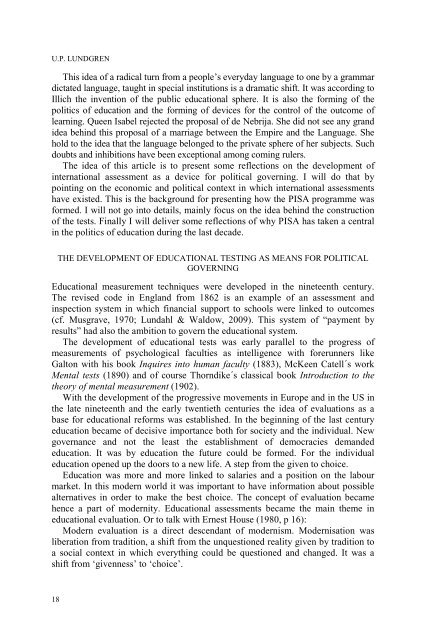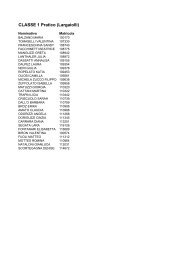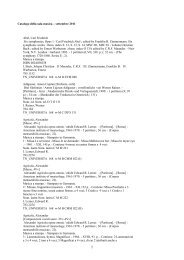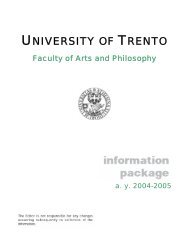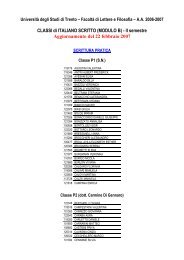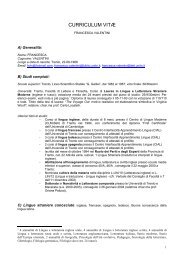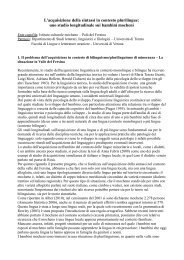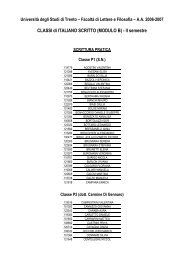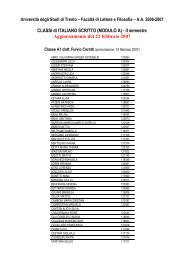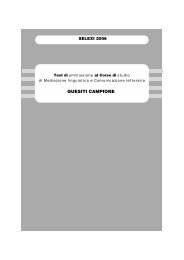PISA Under Examination - Comparative Education Society in ...
PISA Under Examination - Comparative Education Society in ...
PISA Under Examination - Comparative Education Society in ...
You also want an ePaper? Increase the reach of your titles
YUMPU automatically turns print PDFs into web optimized ePapers that Google loves.
U.P. LUNDGREN<br />
This idea of a radical turn from a people’s everyday language to one by a grammar<br />
dictated language, taught <strong>in</strong> special <strong>in</strong>stitutions is a dramatic shift. It was accord<strong>in</strong>g to<br />
Illich the <strong>in</strong>vention of the public educational sphere. It is also the form<strong>in</strong>g of the<br />
politics of education and the form<strong>in</strong>g of devices for the control of the outcome of<br />
learn<strong>in</strong>g. Queen Isabel rejected the proposal of de Nebrija. She did not see any grand<br />
idea beh<strong>in</strong>d this proposal of a marriage between the Empire and the Language. She<br />
hold to the idea that the language belonged to the private sphere of her subjects. Such<br />
doubts and <strong>in</strong>hibitions have been exceptional among com<strong>in</strong>g rulers.<br />
The idea of this article is to present some reflections on the development of<br />
<strong>in</strong>ternational assessment as a device for political govern<strong>in</strong>g. I will do that by<br />
po<strong>in</strong>t<strong>in</strong>g on the economic and political context <strong>in</strong> which <strong>in</strong>ternational assessments<br />
have existed. This is the background for present<strong>in</strong>g how the <strong>PISA</strong> programme was<br />
formed. I will not go <strong>in</strong>to details, ma<strong>in</strong>ly focus on the idea beh<strong>in</strong>d the construction<br />
of the tests. F<strong>in</strong>ally I will deliver some reflections of why <strong>PISA</strong> has taken a central<br />
<strong>in</strong> the politics of education dur<strong>in</strong>g the last decade.<br />
THE DEVELOPMENT OF EDUCATIONAL TESTING AS MEANS FOR POLITICAL<br />
GOVERNING<br />
<strong>Education</strong>al measurement techniques were developed <strong>in</strong> the n<strong>in</strong>eteenth century.<br />
The revised code <strong>in</strong> England from 1862 is an example of an assessment and<br />
<strong>in</strong>spection system <strong>in</strong> which f<strong>in</strong>ancial support to schools were l<strong>in</strong>ked to outcomes<br />
(cf. Musgrave, 1970; Lundahl & Waldow, 2009). This system of “payment by<br />
results” had also the ambition to govern the educational system.<br />
The development of educational tests was early parallel to the progress of<br />
measurements of psychological faculties as <strong>in</strong>telligence with forerunners like<br />
Galton with his book Inquires <strong>in</strong>to human faculty (1883), McKeen Catell´s work<br />
Mental tests (1890) and of course Thorndike´s classical book Introduction to the<br />
theory of mental measurement (1902).<br />
With the development of the progressive movements <strong>in</strong> Europe and <strong>in</strong> the US <strong>in</strong><br />
the late n<strong>in</strong>eteenth and the early twentieth centuries the idea of evaluations as a<br />
base for educational reforms was established. In the beg<strong>in</strong>n<strong>in</strong>g of the last century<br />
education became of decisive importance both for society and the <strong>in</strong>dividual. New<br />
governance and not the least the establishment of democracies demanded<br />
education. It was by education the future could be formed. For the <strong>in</strong>dividual<br />
education opened up the doors to a new life. A step from the given to choice.<br />
<strong>Education</strong> was more and more l<strong>in</strong>ked to salaries and a position on the labour<br />
market. In this modern world it was important to have <strong>in</strong>formation about possible<br />
alternatives <strong>in</strong> order to make the best choice. The concept of evaluation became<br />
hence a part of modernity. <strong>Education</strong>al assessments became the ma<strong>in</strong> theme <strong>in</strong><br />
educational evaluation. Or to talk with Ernest House (1980, p 16):<br />
Modern evaluation is a direct descendant of modernism. Modernisation was<br />
liberation from tradition, a shift from the unquestioned reality given by tradition to<br />
a social context <strong>in</strong> which everyth<strong>in</strong>g could be questioned and changed. It was a<br />
shift from ‘givenness’ to ‘choice’.<br />
18


